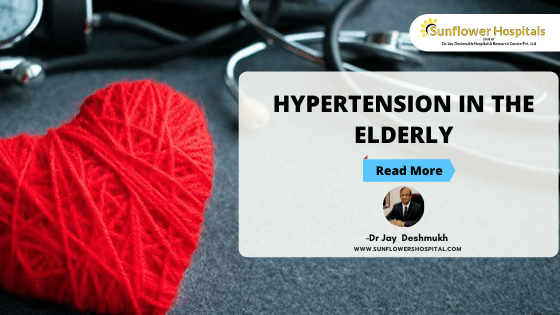high blood pressure in individuals above 60 to 65 n years age group is a very common phenomenon. Blood pressure increases with age and thus there is a huge population in India with high blood pressure in the elderly group. The overall management principles are different in the elderly and throw a huge challenge to the health care system. Many above 60 are not aware of their BP. More than 50% of them do not have their blood pressure under control.
What is a Normal Blood Pressure at the age of 60 years and above?
In the majority, the BP readings should not exceed 190/90 mm. However, those above 80 years should have a BP of 160/90. As high BP may not be associated with symptoms, monthly measurement of BP in the elderly is suggested. Home BP measurement by the digital instrument is recommended. The digital instrument for measuring BP is considered accurate and reliable.
What is so different about BP in the elderly? Elderly individuals have a systolic type of hypertension. In the younger population, there is a rise in both systolic and diastolic BP measurements. Scientists believe that systolic hypertension if not controlled can lead to paralytic stroke including brain hemorrhage. The incidence of stroke increases multifold if you have associated Diabetes and high cholesterol. Uncontrolled hypertension in the elderly also increases the incidence of heart failure, atrial fibrillation and coronary artery disease, and progressive kidney disease. Bleeding from the nose or retinal disorders causing visual complications are common in the elderly if the BP is not under control.
What precautions are needed to prevent complications due to high blood pressure?
Please check BP both in sitting and standing positions. There could be a drop in standing BP due to therapy or autonomic nervous system failure. There is therefore a risk of the person falling down due to low BP and injuring himself seriously. Please take your medications regularly. There are instances of individuals getting seriously ill due to brain haemorrhage or heart failure due to poor compliance. This happens due to uncontrolled hypertension.
What about salt intake?
Reducing salt intake to less than 5 grams per day is recommended. Elderly patients have salt-sensitive hypertension and thus food items like pickles, chutneys, papads and salted fish and packaged snacks need to be avoided. Certain antihypertensive drugs may cause low sodium in the blood. Low sodium levels in the blood in the elderly can cause a confusional state or even convulsions. If on diuretic therapies, estimation of sodium and potassium in blood as per your doctor’s suggestion is recommended.
What is the role of exercise and blood pressure control in the elderly?
A regular walk for at least 30 minutes is recommended. If you are sedentary, start walking slowly at 10 minutes per day and increase by 5 minutes per week. If you feel breathless, dizzy or have chest discomfort on walking inform your family doctor. Walking regularly is known to reduce blood pressure, improve balance and make your bones stronger. If you are overweight, a low-calorie diet and regular walking will always reduce your weight and thus your blood pressure. Yoga is an excellent way to exercise and thus be relaxed and stress-free.
Can I stop blood pressure medications if I feel well?
Medications are to be taken on life long basis if you have high blood pressure. Your doctor will adjust the doses if there are changes in the readings. In spite of very high blood pressure, you may not have symptoms at all. If on therapies for hypertension, your BP measuring device is your best friend indeed.
What are the investigations required?
You should be doing your tests for Diabetes, Cholesterol, kidney functions including Sodium and Potassium levels. Haemoglobin, ECG, urine examination on a regular basis. These tests are required quite frequently, though your family doctor will guide you in this regard.
How safe is the vaccine against coronavirus in the elderly with hypertension?
There is nothing on fear about the vaccination. If the blood pressure is under control, the vaccine is absolutely safe. Even if you are on blood thinners or anticoagulants, the vaccine is absolutely safe. Many individuals above 60 years with hypertension are known to die suddenly due to heart attack or brain hemorrhage. Many are unaware of their BP readings and many stop their treatment on their own. Many deaths, admissions to the ICU, and the need for dialysis can be prevented by a simple measure of good control over high blood pressure readings.
Author: Dr Jay Deshmukh
Dr Jay Deshmukh is Chief Physician and Director, Sunflower Hospital, Nagpur Honorary Physician to Honorable Governor of Maharashtra and PondicherryCentral. Dr Jay Deshmukh is an M.B.B.S., M.C.P.S., F.C.P.S., M.N.A.M.S., MD From Internal Medicine – Bombay and New Delhi.


